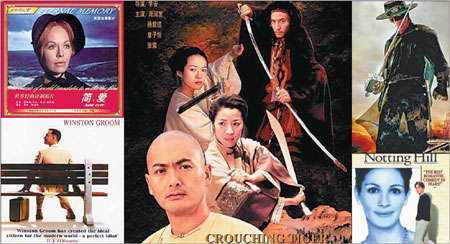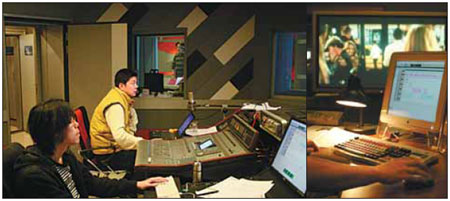Movie industry gets lost in translation
Updated: 2012-11-29 08:03
By Zhang Yuchen (China Daily)
|
||||||||
|
Some of the movies dubbed into either English or Chinese. Provided to China Daily |
|
A voice-over crew works on sound post-production at a recording studio in the dubbing center of China Film Group. Provided to China Daily |
Chinese audiences are demanding a greater number of dubbed foreign films at their local cinemas, but the domestic industry faces unprecedented problems, as Zhang Yuchen reports from Beijing.
As she accompanied a group of friends on a trip to the cinema in Shanghai, Zhong Qiu found herself unable to provide a convincing answer to a question posed by one of her fellow students, a girl from overseas: "It's natural for us to watch movies in English, but why aren't more international films dubbed into Chinese so people can watch them in their mother tongue?"
The group had found plenty of movies, but they were all foreign films being screened in their original formats.
Zhong, a major in Sino-US financial relations, didn't really understand the question. As far as she is concerned, it's "natural" to watch English-language films in English, without Chinese dubbing.
However, Zhong's puzzlement is hardly surprising. In China, it's rare to find international movies dubbed in Chinese after 7 pm. Although many cinemas arrange a few daytime screenings of dubbed films, there are dozens of showings in the original language every day.
Since 2001, Shanghai Dubbing Studio, established in 1957, has dubbed only around 20 films from other regions in Chinese annually.
"As a cultural phenomenon, films dubbed in Chinese have suffered financial and talent problems in recent years, but that's not the whole picture," said Yang Heping, director of the dubbing center at China Film Group Corp.
The golden age
Born in the 1990s, Zhong missed out on the "Golden Age" of Chinese-dubbed movies. During the mid-1980s, the reform and opening-up policy saw the country import around 1,300 movies from all around the world. All were dubbed in Chinese, with the lines delivered by famous "voice actors".
The first foreign films came to China in 1896. The language problem wasn't an issue in those days because the movies were all silent productions, filmed before the invention of "talkies". Although foreign films with Chinese subtitles began to appear on the big screen in 1922, the real breakthrough came in 1949 when Chinese audiences were treated to a Soviet film featuring Western-looking actors, who, crucially, spoke in Mandarin.
During the 1950s and 60s, around 50 foreign movies were dubbed in Chinese every year, but the audience was limited to senior officials. Very few, if any, members of the general public were able to see these movies, which were almost exclusively productions of the Soviet Union or its satellite states, which shared China's communist ideology.
The Golden Age arrived in the 1980s, when Chinese audiences were able to see a wide range of films from different parts of the world, all dubbed in Mandarin.
Many foreign actors became popular with Chinese audiences. For example, Zorro won a large number of fans when it was first screened in China in 1985, with the voice of a Chinese actor replacing that of Alain Delon, who played the eponymous hero.
"At that time, the voice represented, to a large extent, the image of the hero," said Shi Chuan, a doctoral advisor at the School of Film & TV Arts and Technology at Shanghai University.
When Delon visited China in the late 1980s, he made a point of thanking Tong Zirong, an actor at the Shanghai Dubbing Studio whose sparkling vocal performance added greatly to the appeal of Zorro, originally portrayed as a Spanish speaker.
It wasn't until his visit that regular Chinese moviegoers actually heard Delon's real voice. Apparently, it was a disappointment to many, according to Shi, as the Frenchman didn't sound as glamorous as the character he portrayed.
During that period, dubbing allowed Chinese cinema audiences to become familiar with the marital predicament facing Jane Eyre and the famous "Life is like a box of chocolates" line, uttered by a wistful Forrest Gump, played by Tom Hanks.
A whole crew of professional voice actors were widely known for their excellent voice-over performances.
Death knell
As China opened up to the outside world, the pace of change accelerated. From the mid-1990s, 10 foreign blockbusters were allowed into the Chinese market every year, with revenues split evenly between the moviemakers and local distributors. From that point, Chinese audiences were given unprecedented access to a wider range of cultural products from the West. "The market became more diverse and people stopped focusing exclusively on the arts," said Yang.
However, this easier access sounded the death knell for many of the old-school Chinese voice actors, whose rigidly stylised performances proved unattractive to younger audiences.
"The old voice-over methods showcased certain fixed values among voice-performance artists who had strong, individual styles and ways of illustrating characters in the story," said Shi. "Today, audiences are rarely able to identify a single voice among the various roles played by the same actor. Voice-overs have been transformed from a sort of performance art into a bridge that crosses the language barrier," he said.
China's cultural authorities still assign all foreign movies to just four dubbing companies, located in Beijing, Shanghai and Changchun, the capital of Jilin province.
Budgets are restricted, with the crews receiving a mere 50,000 yuan ($8,000) for each production. The limited budget means there is precious cash little left over once post-production costs - including script translation and adaptation, voice casting and synchronization - have been covered.
Even in the days when the budget per feature was twice as high, studios could only just scrape by. "In the past, we had a few months to finish each entire job," said Liao Lin, a dubbing producer in Beijing. "Now we have about one week before the movie hits the screen. In tight circumstances like these, we feel it's unfair if we receive complaints about the lower quality of the output."
At one time, an dubbing producer was able to summon an experienced crew, but nowadays few of the staff work in the dubbing industry full time.
Sporadic employment
While the situation in China is parlous, even less attention is paid to dubbing Chinese movies into English or other languages. At present, China has no program to oversee translations for subtitles, let alone dubbing.
"Given the difficulties understanding the cultural references embedded in Chinese characters, it is crucial that we establish a program to specifically target overseas markets," said Liao.
Roger Savage has 40 years experience in the Australian movie industry and is a leading light at the post-production sound outfit Soundfilm. Having worked on the Chinese production Let the Bullets Fly, Savage said post-production crews often discover errors in completed subtitles.
Savage said dubbing a movie from Chinese to English can cost from $5,000 to $25,000, but the exact cost depends on the ratio of dialogue to action sequences.
On one of China's most successful movies overseas Crouching Tiger, Hidden Dragon, the dubbing into English cost $80,000, according to Savage. "But Chinese producers and film companies obviously have yet to realize that their films can reach a wider audience in the Western market," he said.
Yang Heping, director of the dubbing center of China Film Group, said it is unrealistic to lay the burden of dubbing on movie film companies alone. "The government needs to offer strategic and financial support for the Chinese dubbing industry," he said.
In addition, with a huge number of foreign TV dramas, online games and cartoons in need of dubbing, movie and amateur voice actors are now playing a much more active role in the business because of technological developments in online dubbing services. Those developments, however, are helping to reduce the overall quality.
China's only State-owned dubbing company, Shanghai Dubbing Studio, has yet to discover a way out of the dilemma that sees professionals working only sporadically, especially as the companies only receive a set fee for their work and are never entitled to a cut of the profits at the boxoffice.
"We have to provide dubbing-related services for animations or other projects just to keep busy," said Jiang Jing, marketing manager at Shanghai Dubbing Studio. She added that the most effective way of protecting and expanding a healthy dubbing industry would be to establish a series of regulations and standards for the industry.
"That would make the average good, and the good brilliant," she said
Contact the reporter at zhangyuchen@chinadaily.com.cn
(China Daily 11/29/2012 page6)

 Relief reaches isolated village
Relief reaches isolated village
 Rainfall poses new threats to quake-hit region
Rainfall poses new threats to quake-hit region
 Funerals begin for Boston bombing victims
Funerals begin for Boston bombing victims
 Quake takeaway from China's Air Force
Quake takeaway from China's Air Force
 Obama celebrates young inventors at science fair
Obama celebrates young inventors at science fair
 Earth Day marked around the world
Earth Day marked around the world
 Volunteer team helping students find sense of normalcy
Volunteer team helping students find sense of normalcy
 Ethnic groups quick to join rescue efforts
Ethnic groups quick to join rescue efforts
Most Viewed
Editor's Picks

|

|

|

|

|

|
Today's Top News
Health new priority for quake zone
Xi meets US top military officer
Japan's boats driven out of Diaoyu
China mulls online shopping legislation
Bird flu death toll rises to 22
Putin appoints new ambassador to China
Japanese ships blocked from Diaoyu Islands
Inspired by Guan, more Chinese pick up golf
US Weekly

|

|








